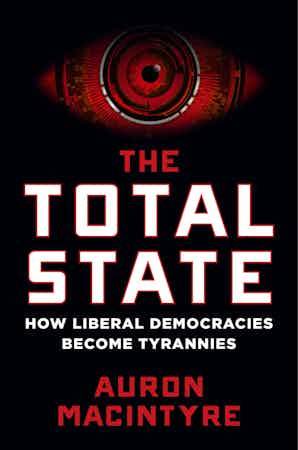At The Upheaval, N.S. Lyons reviews The Total State: How Liberal Democracies Become Tyrannies by Auron MacIntyre:
Even when our nation’s dysfunction becomes too obvious to ignore, average Americans tend to comfort themselves with the story that it at least remains a democratic, constitutional republic. For such Americans, it’s probably been a confusing summer.
One moment the sitting president was, according to the near-universal insistence of mainstream media, sharp as a tack — all evidence to the contrary declared merely dangerous disinformation. The next he was suddenly agreed to be non compos mentis, unceremoniously ousted from the ballot for reelection, and replaced, not in a democratic primary but through the backroom machinations of unelected insiders. Overnight, the same media then converged to aggressively manufacture a simulacrum of sweeping grassroots enthusiasm for that replacement, the historically unpopular Kamala Harris. To call this a palace coup via The New York Times would seem not to stray too far from observable events.
What, some may wonder, just happened to our sacred democracy?
For those on the growing segment of American politics broadly known as the “New Right,” none of this was a surprise. The basic premise of the New Right — whose ranks notably include now-vice presidential candidate J.D. Vance — is that the governance of our country simply doesn’t function as we’re told it does. In fact, the United States has not operated as a constitutional republic for some time now; it is only the façade of one, effectively controlled by an unevictable cadre of rapacious plutocratic elites, corrupt party insiders, unelected bureaucrats, and subservient media apparatchiks — in short, a wholly unaccountable oligarchy.
Among the sharpest recent guides to this argument—and, in my view, to our current broader political moment—is a slim new book by the columnist and influential young New Right thinker Auron MacIntyre, titled The Total State: How Liberal Democracies Become Tyrannies.
MacIntyre provides a dispassionate dissection of how, without any cabal or specific conspiracy, an elite class captured all our major public and private institutions, hollowed them out, set them all marching in lockstep against the American middle-class, and made a mockery of the notion of constitutional “checks and balances”. The resulting “total state” now operates in increasingly flagrant contradiction to the interests of the American people and democratic government while “wearing the old regime like a skinsuit”.
Essential to understanding this total state is the concept of managerialism, an idea first pioneered by an older generation of political thinkers like James Burnham which has been recovered from relative obscurity and re-employed by the New Right. In this framing, America is today effectively run by a “managerial elite”, which presides over a broader professional managerial class — think college administrators, corporate HR managers, and non-profit activists. Fundamentally, the business of such people is not producing or building anything, providing any essential service, or even making critical leadership decisions, but the manipulation and management — that is, surveillance and control — of people, information, money, and ideas.
The story of the fall of the American republic is the story of the managers’ rise to power everywhere.
In part, this was the inevitable outcome of technological and economic change following the industrial revolution, which made it necessary to expand the ranks of people schooled in managing large, complex organizations. But, as MacIntyre demonstrates, it was also the result of a deeply misguided urge, pioneered by early progressives, to de-risk and “depoliticize” politics by handing over decision-making to technocratic “experts”. The hope was that these experts could rationally and neutrally administer government and society from the top down, through the same principles and processes of “scientific management” first applied to the assembly line.
This proved disastrous.




